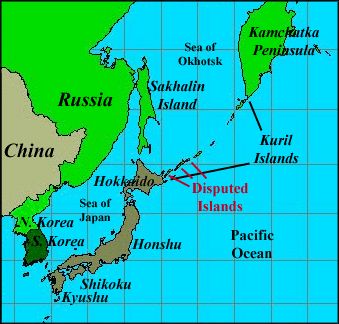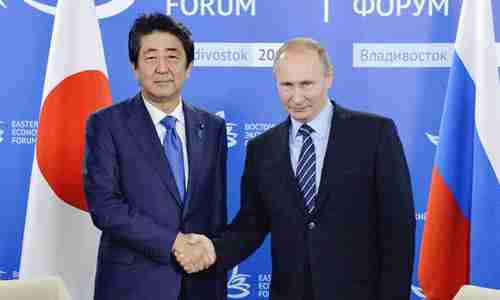Since the end of the WWII relationship between Russia and Japan have been complicated because of the unresolved status of the four islands of the Kuril Ridge. The two countries, despite the passing of six decades, have not yet arrived at a peace treaty.
A week ago, speaking at the World Economic Forum, Japan’s Prime Minister Shinzo Abe called on President Vladimir Putin of Russia to resolve the problem: “Let’s put an end to this abnormal situation, which has existed for 70 years and together begin to build a new era of Russian-Japanese relations, which will last for the next 70 years.”
On September 5 at the press conference on the results of the G20 in Hangzhou, Putin said that in his opinion a compromise on the Kuril problem finally can be reached. This statement caused a real sensation. Nevertheless many commentators doubt that the problem is really going to be resolved.
Putin stressed that the starting point for new agreement will be the agreement concluded by the Soviet Union and Japan in 1956. It implied the transfer of the two out of four disputed southern Kuril Islands to the Japanese side. “However, the agreement did not stipulate a lot more. For example, under what conditions you need to transfer and whose sovereignty over the islands will be “, Putin said. These questions obviously are the main stumbling blocks in the territorial problem, which faces Moscow and Tokyo since the Second World War.
The territorial disputes between Russia and Japan concerning Sakhalin Island and Kuril Islands have a long history.
The first Russo-Japanese agreement to deal with the status of these territories was the 1855 Treaty of Shimoda that established official relations between Russia and Japan. The agreement stated: “The boundary between the two nations shall lie between the islands of Etorofu and Uruppu. The whole of Etorofu shall belong to Japan; and the Kuril Islands, lying to the north of and including Uruppu, shall belong to Russia.”
In the Treaty of Saint Petersburg of 1875, Russia and Japan agreed that Japan would give up all rights to Sakhalin in exchange for Russia giving up all rights to the Kuril Islands in favor of Japan.
The Russo-Japanese war of 1904-1905 ended with the victory of Japan. The 1905 Treaty of Portsmouth, signed at the end of that war, gave the southern half of Sakhalin Island to Japan.
During the Russian Civil War following the October Revolution of 1917 Japan occupied parts of Russia’s Far East, but did not formally annex any of these territories and they were completely vacated by Japan by the mid-1920s.
The Soviet–Japanese Neutrality Pact was signed in Moscow on April 13, 1941 but was unilaterally renounced by the Soviet Union in 1945, when the USSR joined US, declaring the war on Japan. On August 14, 1945 Japan accepted the Potsdam Declaration and on the following day announced unconditional surrender. The Soviet operation to occupy the Kuril Islands took place between August 18 and September 3, 1945. Japanese inhabitants were repatriated two years later.
The modern Kuril Islands dispute results from the ambiguities in and disagreements about the meaning of the Yalta agreement (February 1945), the Potsdam Declaration (July 1945) and the Treaty of San Francisco (September 1951).
In 1956, Moscow and Tokyo have resumed diplomatic relations and stated in a joint declaration that a full peace treaty will be developed.
The declaration stated: “To meet the wishes of Japan and taking into account the interests of Japan, the USSR agrees to transfer to Japan the Habomai and Shikotan islands, provided, however, that the actual transfer of these islands to Japan will be made after the conclusion of the peace treaty between the USSR and Japan.” It was about this document that Putin was speaking at the summit of G20.
Putin in his latest speech stressed that despite the fact that in 1956, both houses of the Japanese parliament ratified the treaty, the Japanese side refused to implement it. But the fact is that the Soviet Union was the one, who stopped the implementation of the transfer.
In a note addressed to the Government of Japan in January 1960, representatives of the USSR pointed out that Japan, by placing American military bases at its territory, violates the terms of the contract on the transfer of the islands. The note said that by agreeing to the transfer of the islands, the Soviet Union took into account the national interests of Japan and the country’s peaceful intentions. The newspaper Pravda published an article which asserted that Japan military agreement with the United States was directed against the USSR, and, if the islands were to be transferred to Japan, it is possible that Japan would place a new American base there. Therefor, the islands will be given to Tokyo only after the withdrawal of US troops from Japan and the signing of a peace treaty between Japan and the Soviet Union.
Since then the attitude to the problem on by both sides was mostly intransigence.
Over the years, the Japanese public has developed an absolute consensus concerning these four islands of the Kuril Ridge. Japanese call these Islands Japanese Northern Territories, and seem to be very certain of the fairness of their demands. Even the Communist Party of Japan (CPJ) had not support USSR control over the Kuril Islands. According to the Japanese Communists, the Soviet Union was supposed to give to Japan not only the two islands, but the entire Kuril archipelago. During the Cold War it caused a sharp deterioration in relations between the Communist Parties of the Soviet Union and Japan.
The Russians have also never been ready to the compromises on this question.
Even Mikhail Gorbachev, who has often been accused by his political opponents of betraying the Soviet positions, was not ready to give Japan even a single island.
Last polls showed that more then half of the Russians are against returning the islands to Japan.
This year, the 1956 declaration will be 60 year old. Round date can be a good opportunity for a serious shift in the Kuril Islands issue. Both sides recognize the declaration, and ready to use it as the main document. There is a hope that the parties will announce a potential compromise on the Kurils during Putin’s state visit to Japan in December.
Russia desperately needs new development in the economic relationship with Japan. There are many plans of making Russian Far East the main area of the economic and industrial development of Russia and cooperation with Japan is the key element in these plans.
Russia had territorial disputes not only with Japan but also with China, but in 2014, after 40 years of negotiations, the matters were resolved. Besides that Russia leases now some Siberian territories to China on the conditions, by opinion of many, very close to just giving them away.
Why Russians’ atitude in dealing with Japan is different from their atitude to dealing with China?
Not long ago Vladimir Putin explained that territorial dispute with Japan is a question of outcome of the WWII and this outcome is sacred for Russians.
Most of experts don’t believe that the compromise is possible.
Georgy Kunadze, former Deputy Forejgn Minister of Russia and a leading expert on Russian-Japanese relations, stated in his interview to a Russian Site Gazeta.ru that he doesn’t believe that a compromise on this issue will be achieved. The expert, who in 1990 took part in the negotiations with the Japanese side, claims that the Japanese do not want the islands themselves, they just care about the “principle”.
Certainly Russians also have their “principles”.



